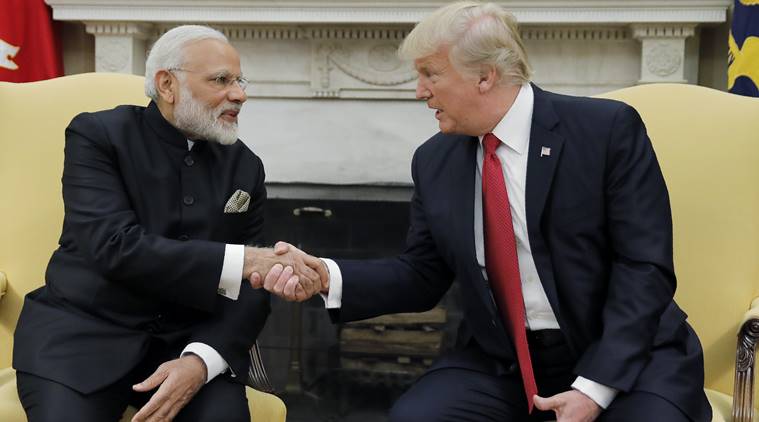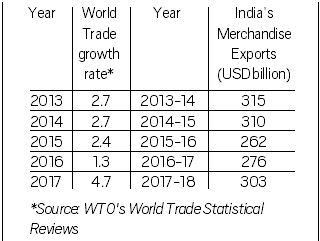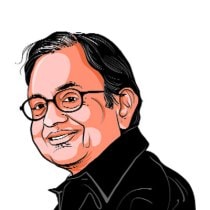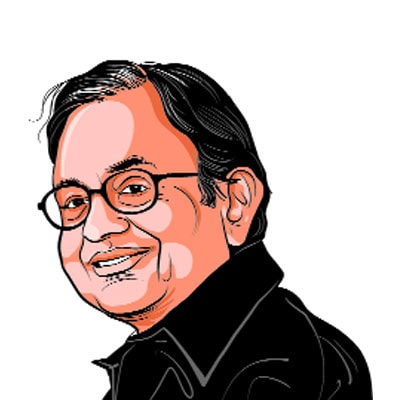Across the aisle: Calculate price of a trade war
It is in India’s interests to be one of the adults in the room and stand up for an open trade order. True, India is not the US or China but is big enough to count... What the world requires is a coalition of sensible countries that will anchor world trade while a few countries disrupt world trade.

Indian PM Narendra Modi (left) and US President Donald Trump. India fired the first shots in December 2017 by raising tariffs on a number of products, ostensibly to bolster the revenues. (source: Reuters/file)
It is not the Third World War, but the consequences will be serious and will hurt all countries of the world. On the trade front, the world’s biggest player, the US, has gone rogue. US President Donald Trump’s policy shifts have rocked the boat of world trade, that had for decades been sailing steadily away from the harbours of protectionism.
The US is arguably the most important economy from the perspective of world trade. Its share of the world’s merchandise exports and imports is 9.12 per cent and 13.88 per cent, respectively. Its share of exports and imports of commercial services is 15.24 per cent and 10.27 per cent, respectively. Roughly, one-fourth of world trade in goods and services is accounted for by one country! Candidate Trump had made his intentions clear during his election campaign. Hence, the US’s decision to turn protectionist is not sudden or unexpected.
Consensus Breaks Down
It is not that there was no protectionism in the trading system before the recent decisions of the US. Countries did exercise selective protectionism on select goods, especially where there were strong local interests that needed to be protected (the swadeshi lobbies!). However, there was a general consensus that protectionism was not a good thing and was an aberration in the general move towards open and free trade.

The US going rogue means that there is a shift in what is considered acceptable. Given how trade wars work, protectionism could soon become the norm, and decades of work on establishing a rule-based trading order may be imperilled. The recent decisions on tariffs suggest that the US President truly believes what he tweets: “trade wars are good and easy to win”. He is upset about China’s alleged currency manipulation and by high tariffs by some countries (eg. India’s tariff on imported luxury bikes; Canada’s tariff on dairy products, etc).
Contrary to Mr Trump’s belief, history and experience tell us that trade wars are neither good nor easy to win. They will leave almost all countries bruised and the world as a whole will be worse off. The current trade war was triggered by the persisting imbalance in trade between the US and China (Advantage China: USD 375 billion in 2017) and is not yet a full-blown war. However, the war is drawing in other countries as well. The US and China, and the US and Europe, have raised tariffs against each other’s imports. Indian exports of steel and aluminium also got caught in the crossfire just because of a USD 23 billion trade deficit for the US against India!
India Joins War
What should India’s response be? India fired the first shots in December 2017 by raising tariffs on a number of products, ostensibly to bolster the revenues. In the Budget for 2017-18, a desperate-for-revenue government raised tariffs on more products. In view of Mr Trump’s past pronouncements, it is difficult to believe that the government’s December 2017 and February 2018 steps were unrelated to, and without anticipation of, the decisions that the US government took later.
I am afraid the context has now changed. We seem to be in the middle of multiple trade wars and India has allowed itself to be dragged into the war by imposing tariffs on 28 goods from the US that will yield, if import volumes remain the same, an additional USD 240 million. This is a huge risk for India. Growing volume of trade was one of the main drivers of the enormous expansion of world output in the post-war years. Developing countries like India could become manufacturing hubs or major service providers. Conversely, a reversal of the growth rates of trade and output will harm developing countries the most.
India’s exports are quite sensitive to the volume of world trade. In the last four years, the growth rates of world trade were less-than-satisfactory; and India’s merchandise export growth was negative (see Table).
Who will be Loser?
A trade war and protectionism will add to a difficult economic situation. No country’s economy has grown briskly (double-digit growth) without exports growing at 15 per cent or more. It is a pipe dream to grow through ‘Make in India’ for India. We have to ‘Make in India’ for the world. That means robust export growth. And this is an engine that has grossly under-performed in the last four years.
It is in India’s interests to be one of the adults in the room and stand up for an open trade order. True, India is not the US or China but is big enough to count. Our share of global merchandise exports and imports is 1.65 per cent and 2.21 per cent, respectively. Our share of exports and imports of commercial services is 3.35 per cent and 2.83 per cent, respectively. What the world requires is a coalition of sensible countries that will anchor world trade while a few countries disrupt world trade.
I offer unsolicited advice: here is an opportunity for India to avoid the path of retaliatory tariffs and negotiate with the US with the offer of more trade and lower tariffs, not less trade and higher tariffs.
I offer unsolicited advice: here is an opportunity for India to avoid the path of retaliatory tariffs and negotiate with the US with the offer of more trade and lower tariffs, not less trade and higher tariffs.
Website: pchidambaram.in
Twitter: @Pchidambaram_IN
Twitter: @Pchidambaram_IN
For all the latest Opinion News, download Indian Express App
More From P Chidambaram
- Across the aisle: The remains of the dayWhen the political parties demanded a ceasefire for the Ramzan month, the Chief of Army Staff had taken upon himself the responsibility of answering the…
- Searching for Shangri-LaThe world’s leaders hear the Prime Minister and applaud his appeal to embrace diversity; and then they read about happenings in Dadri (Mohammed Akhlaq); Alwar…
- Across the aisle: Governments hide, people seekThe mood of the nation is despondent. In the RBI’s survey (May 2018), 48 per cent of respondents felt that the economic situation had worsened








































No hay comentarios:
Publicar un comentario